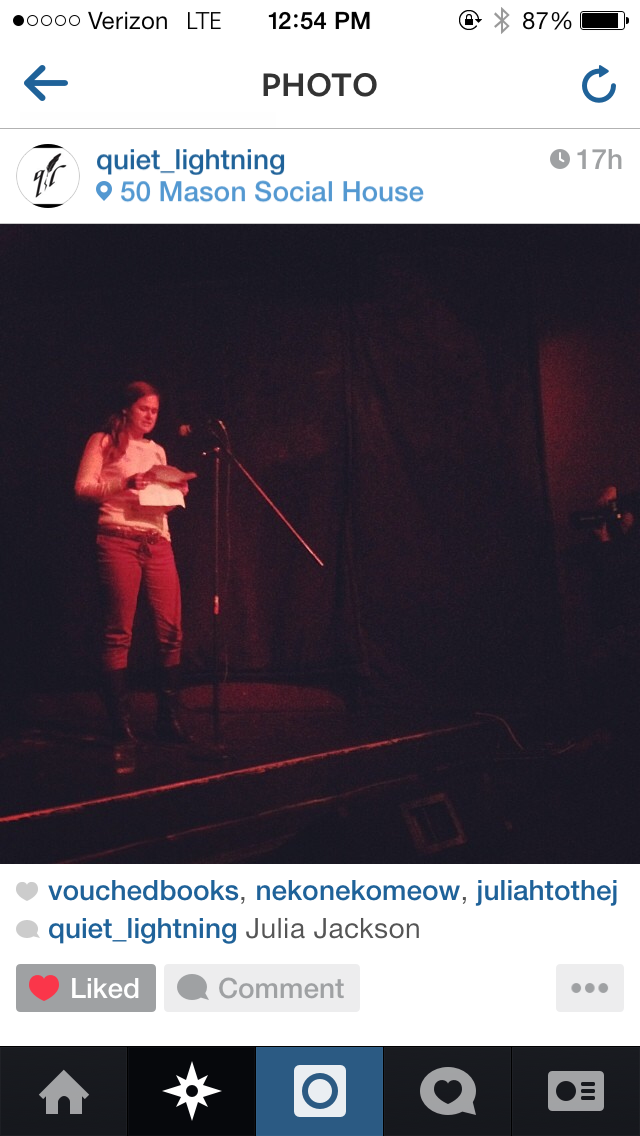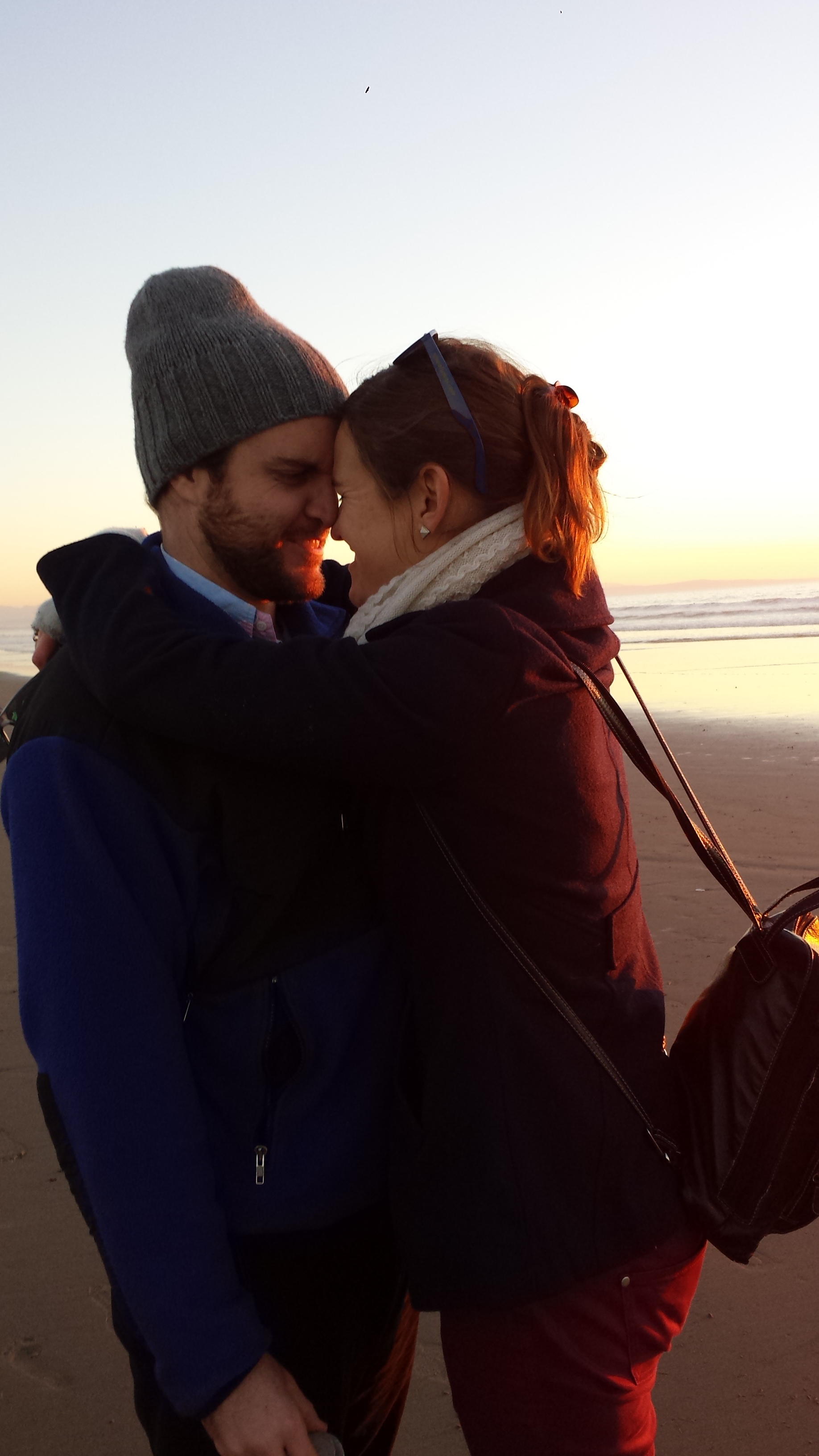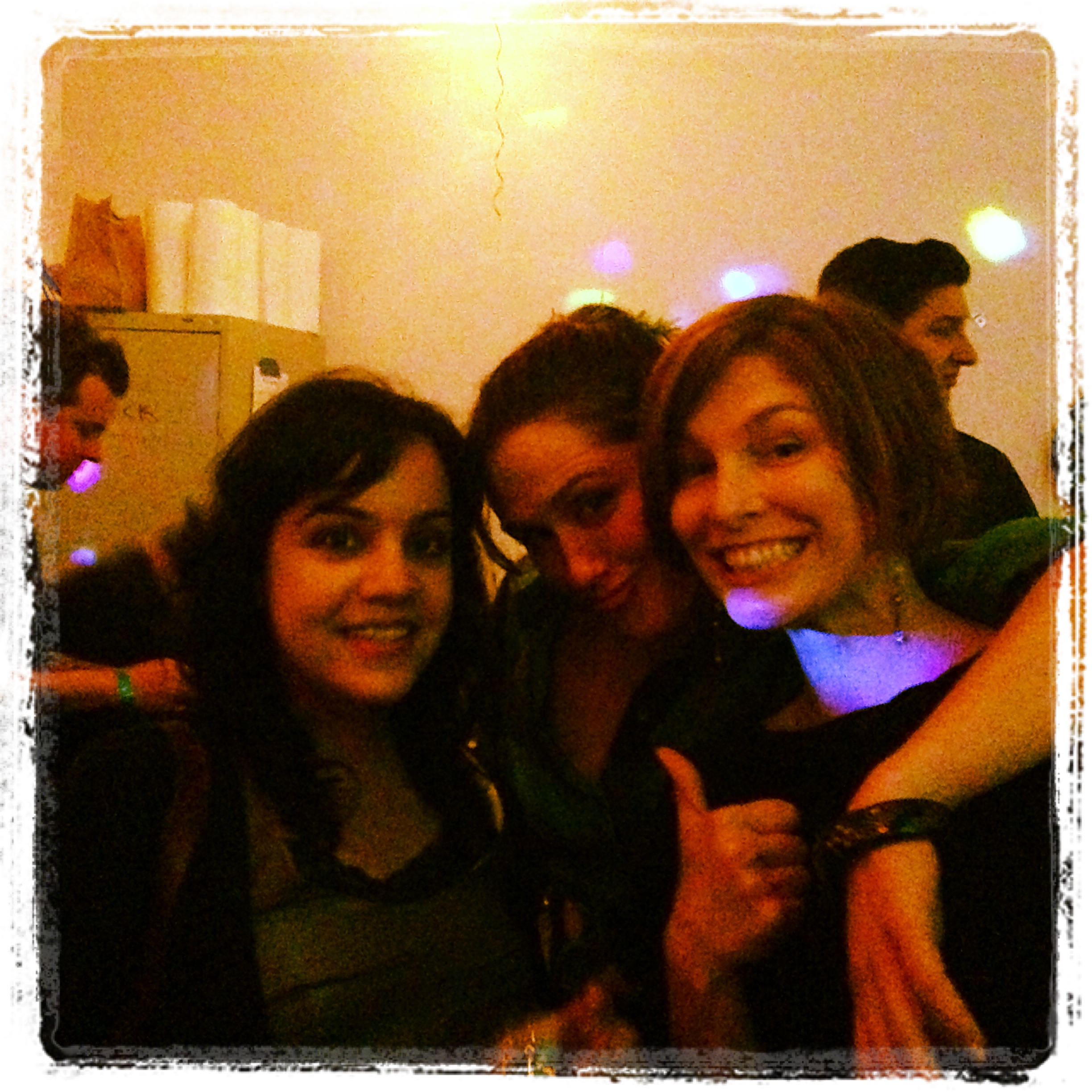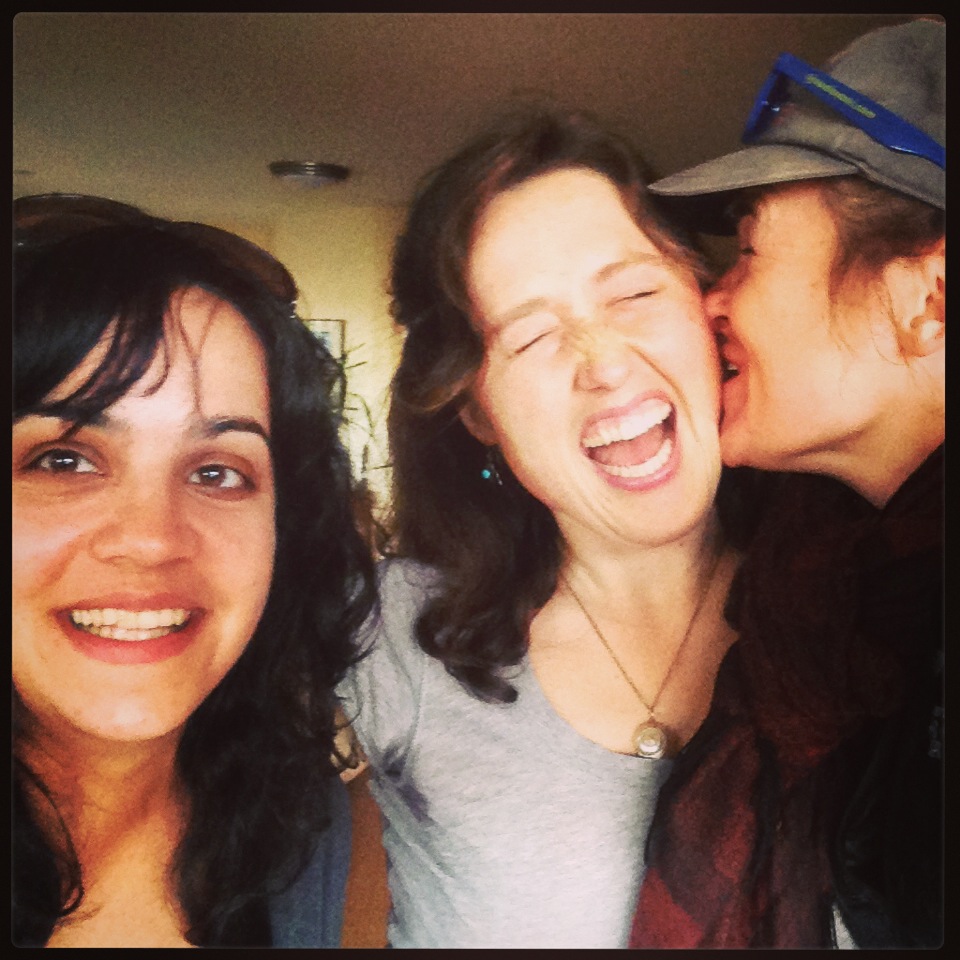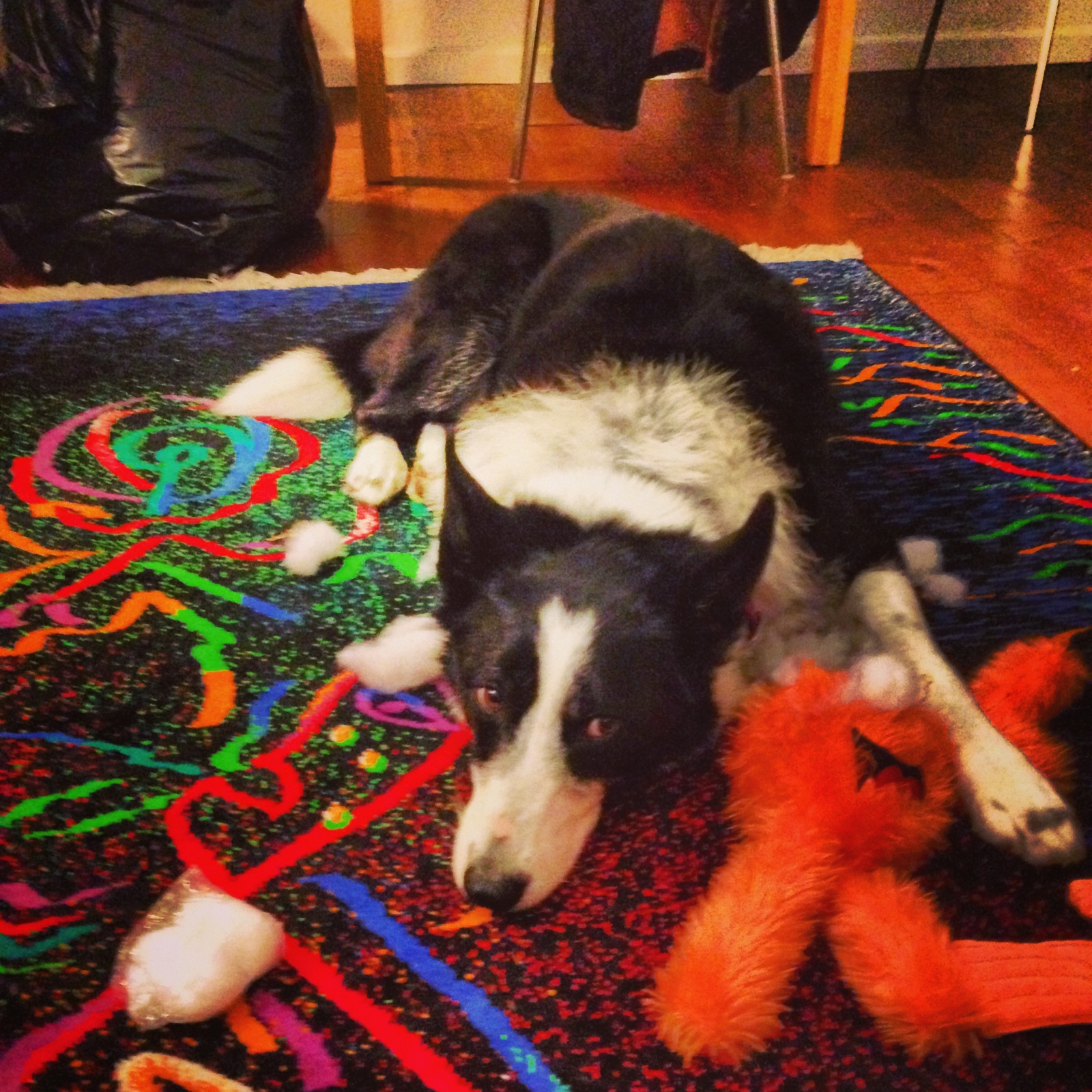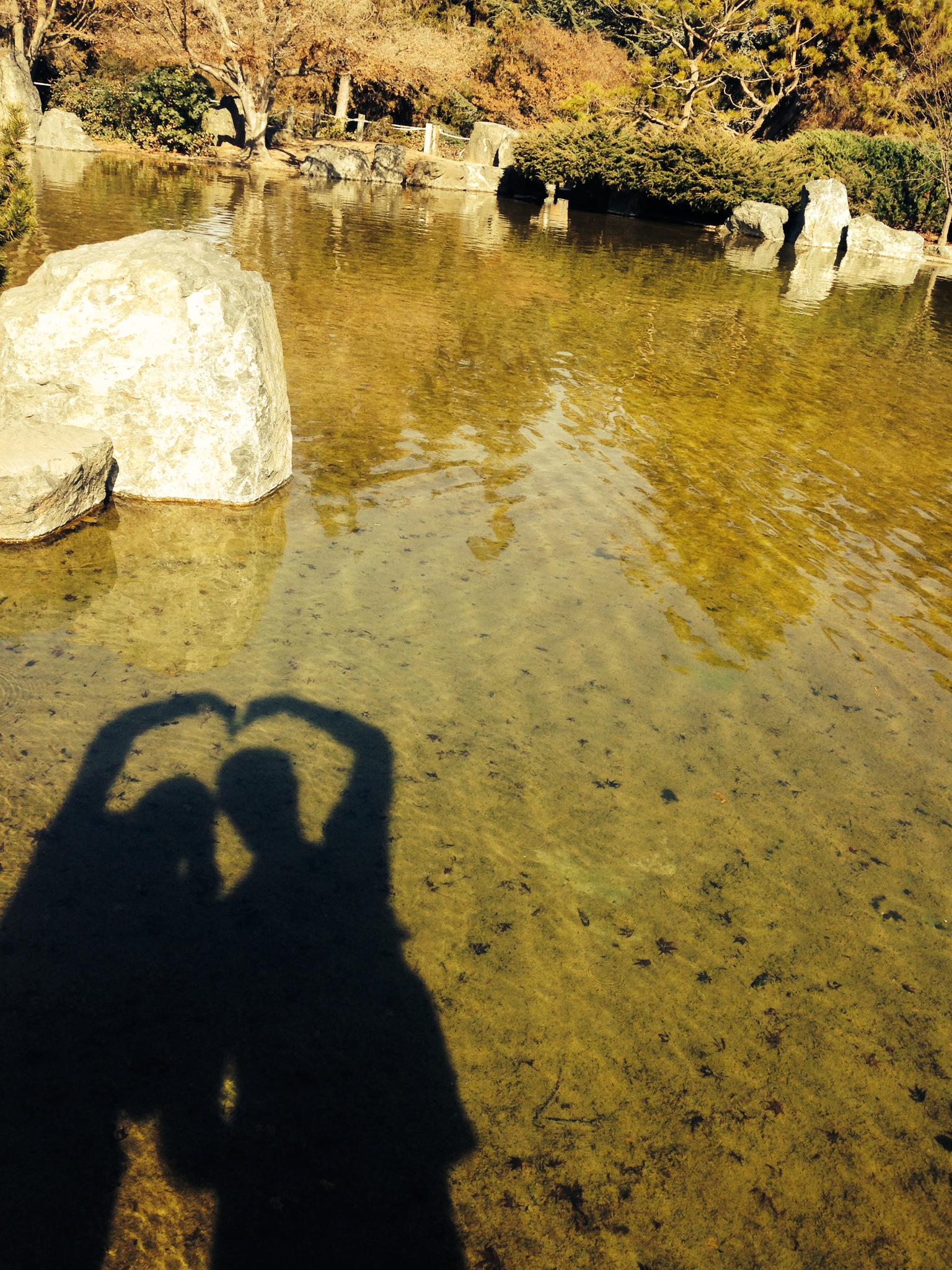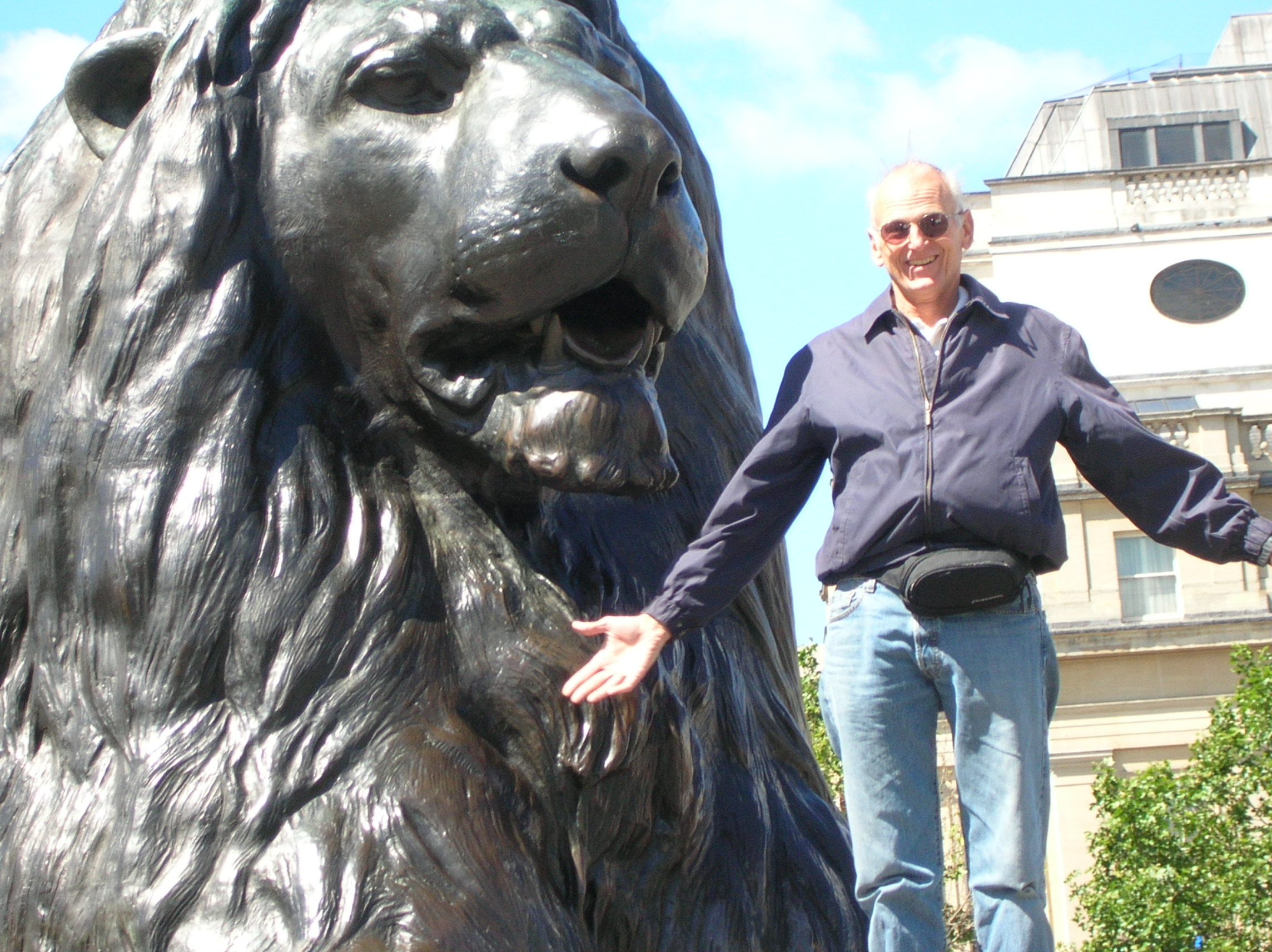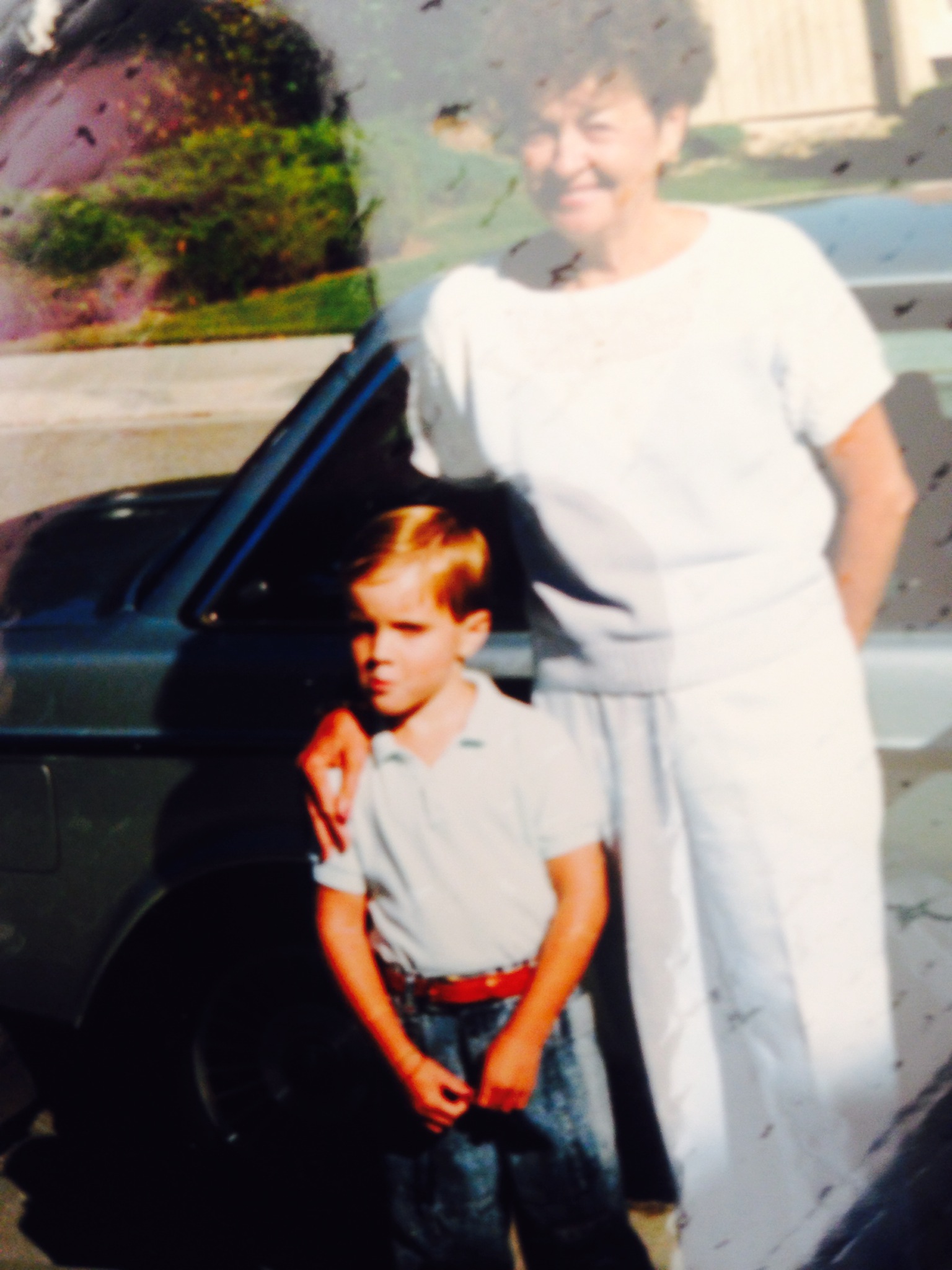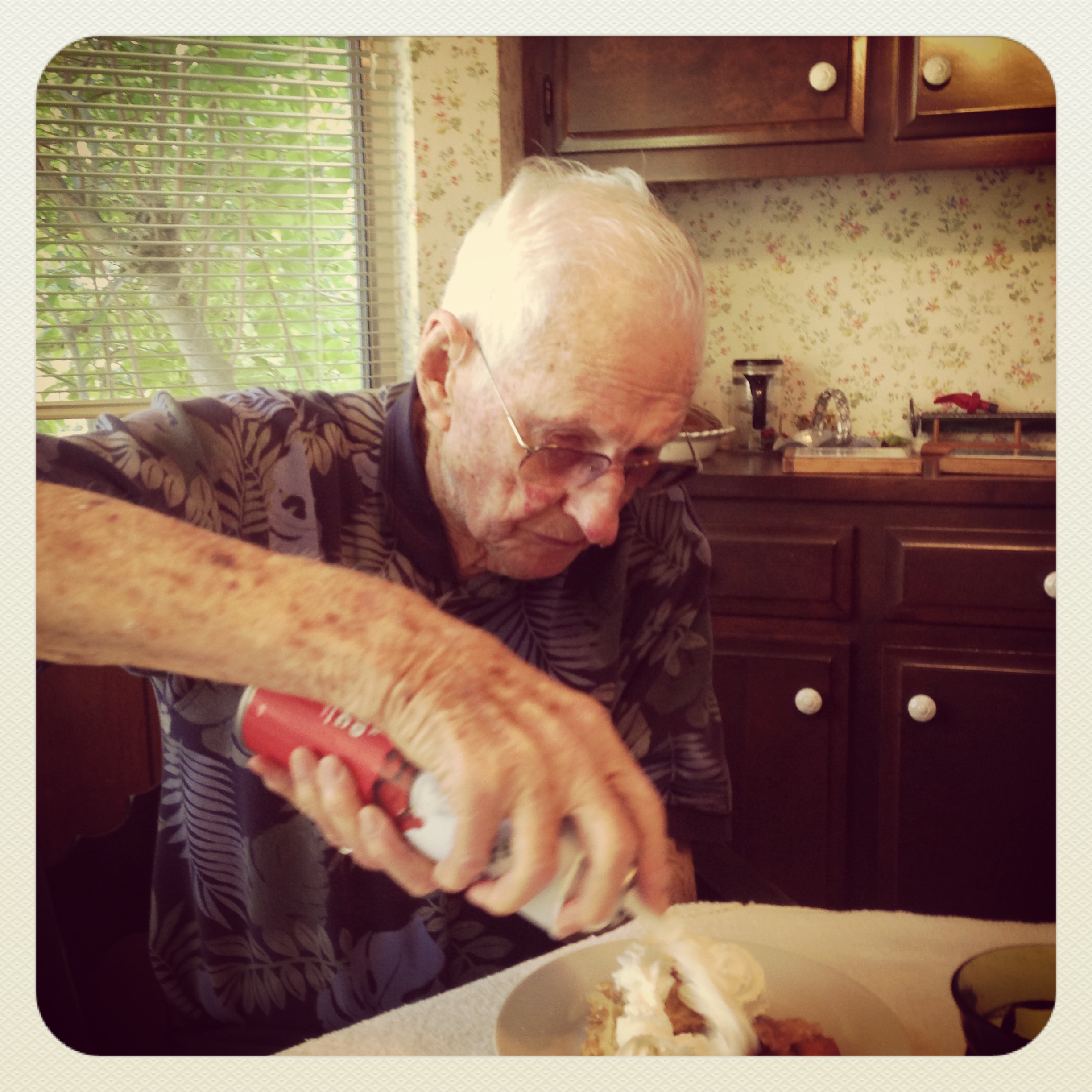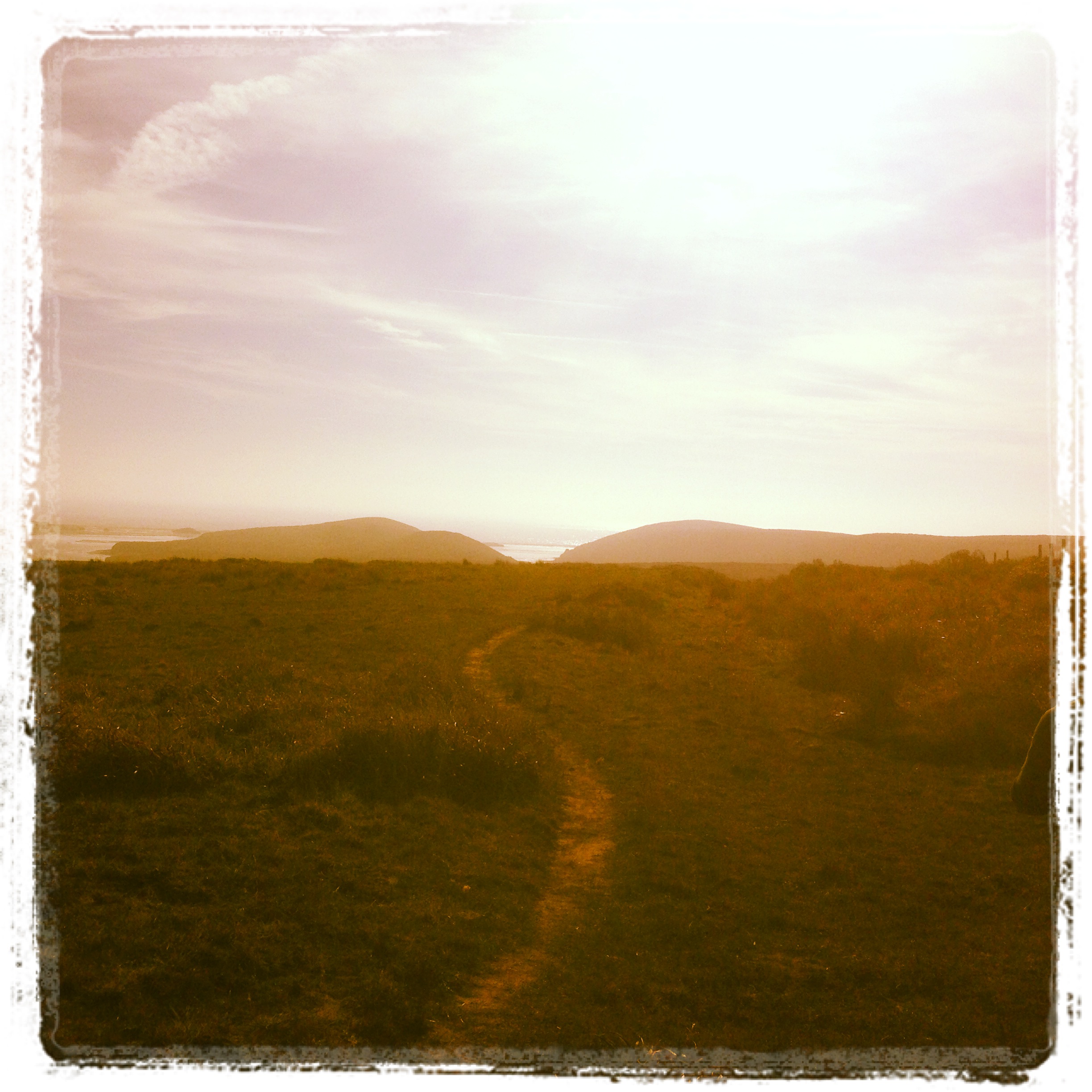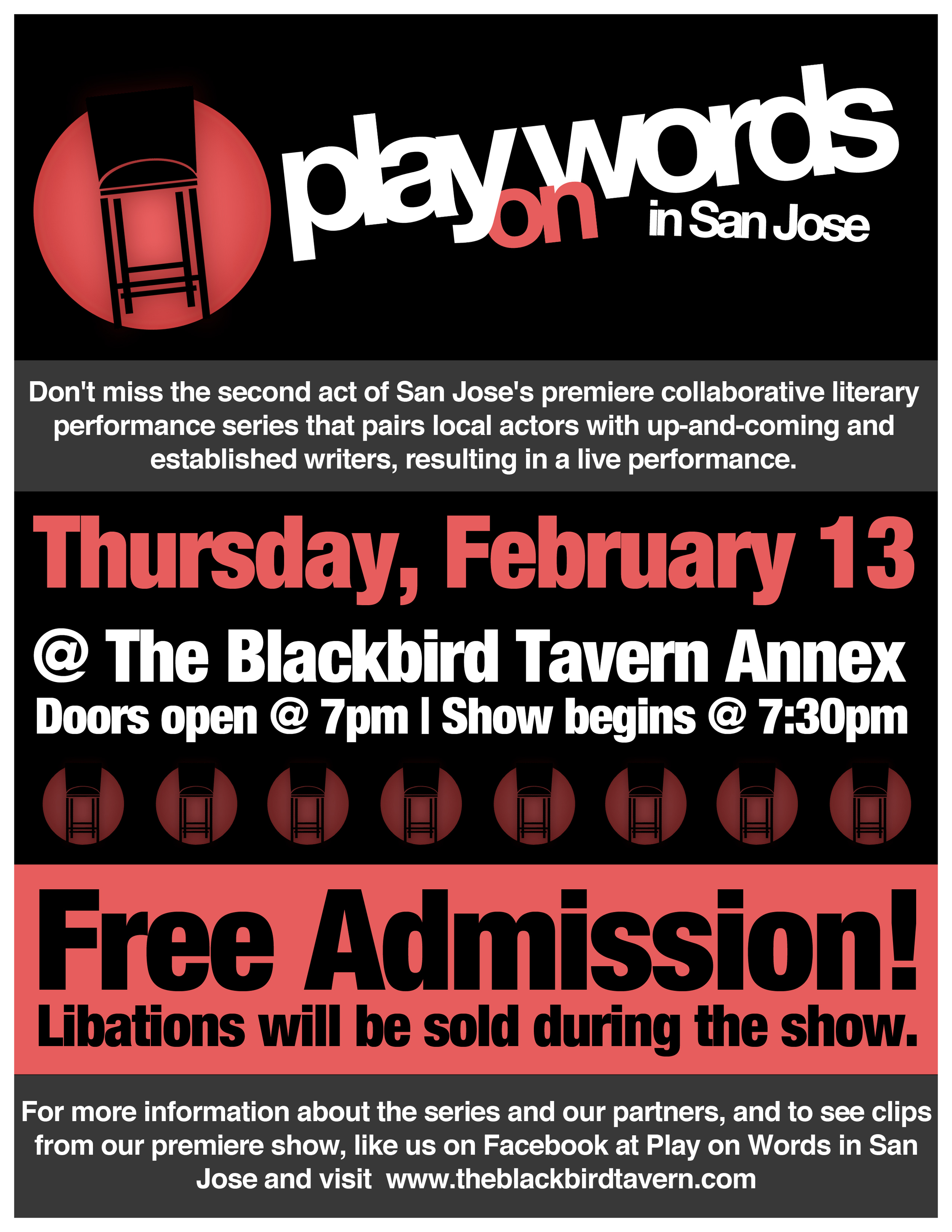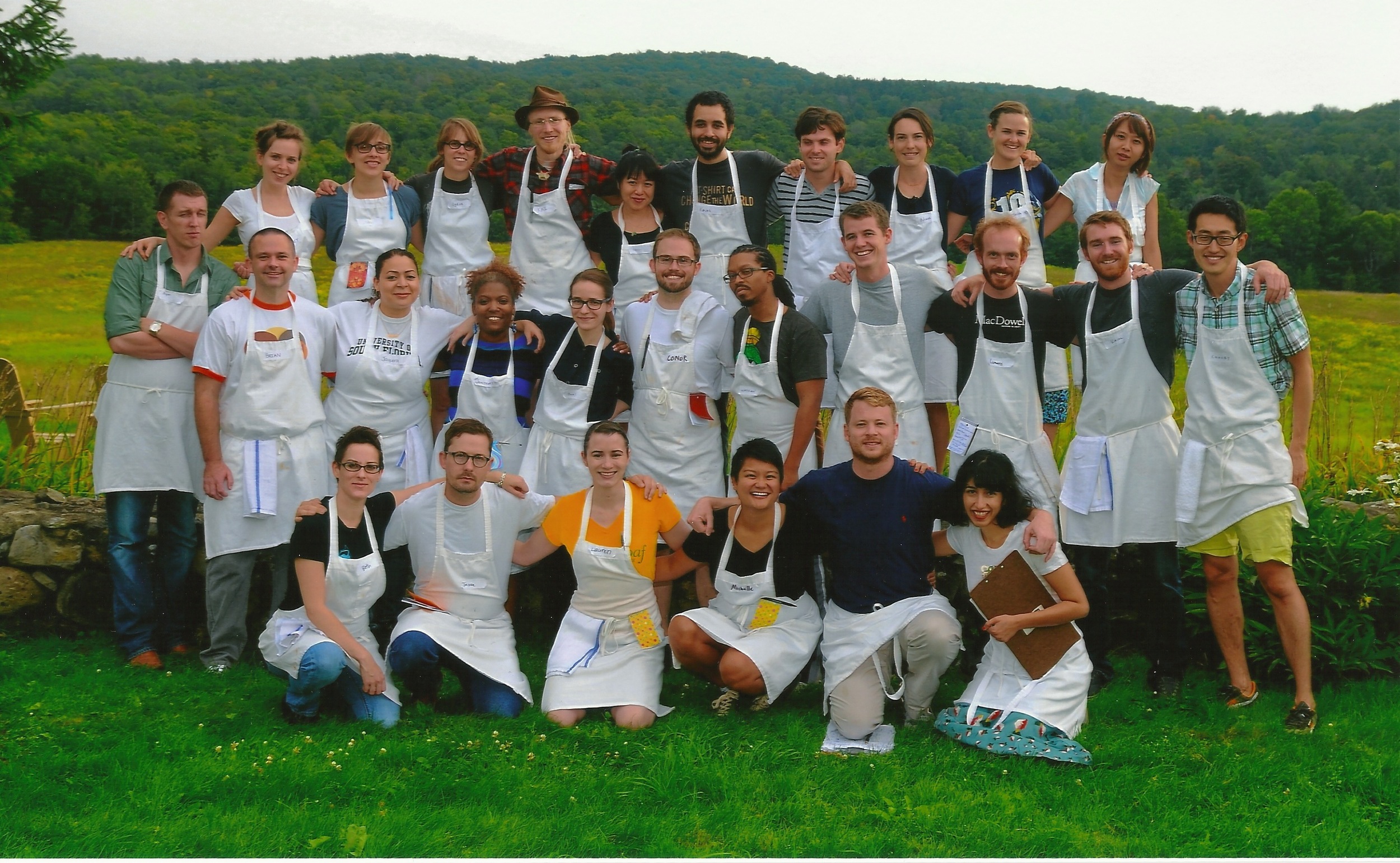An Ode to Pens
My love of writing is in part due to my love for pens. In junior high I was obsessed with a blue Bic pen whose ink I swore had magical qualities. I loved the way the pen's point dug into the surface of the paper; it seemed proof that writing was work, that by putting one letter in front of another, I had made an impact. Pencils were important too, because nothing felt quite so good as pressing my full weight into the lead, implying an emphasis that made bold and italics pale in comparison. Now that I spend most of my professional life perched at the edge of a keyboard, sometimes I’m surprised what can happen when I pick up a pen or pencil.
Ryan and I have an odd collection of pens hidden in various places around our apartment. My favorites are accidental mementos of places we’ve been together--the triangular green pen from Celadon, the restaurant where we dined after we got engaged, or the pens emblazoned with the logos of national parks where we’ve camped. There are fine-point pens for drawing and thick black pens for labeling and dozens of ball-point pens for writing checks, keeping records, and (my favorite) handmade recipe books. The best ones don’t just tell their own stories--they beg for you to write yours down. If I owned my own business, I’d market guerrilla-style, sneaking pens like these with secret messages on them into stores and restaurants.
Is it odd to praise pens in a digital medium? Perhaps. But consider for a moment what happens when you hold a pen. Its very architecture demands that you do something. When you write with a pen or pencil, there is no blinking cursor, just the infinity of blank space. There’s less pressure to stay in line. An implied permission to break the rules. You could take meeting minutes, outline a project proposal, draft a new campaign idea, or you could draw Shakespeare in dog form, or a map of all the countries you’d like to visit. A good pen is an invitation to create. And I’m always up for that.
Anatomy of an Injury
Yesterday, after running six miles along San Jose's Guadalupe River trail, I slipped on a sliver of glass on the sidewalk and landed, knee-first, on a broken tequila bottle. I sat for a moment on the concrete, staring at the jagged gash on my right knee, stunned. I've had my fair share of tumbles and falls, but this was different. The cut was clean but deep. I couldn't look at it. My iPod blared and my insulin pump was still safe on my hip.
I propped myself on the corner of the busy street and the trail, and within a minute had attracted a passing car. The driver was a man with a kind face. He asked if I needed help, and for a split second I considered saying no--I felt wobbly but was more shell-shocked than anything, and our apartment was only two blocks away. Some small voice inside insisted that I could do it--I could get home alone.
I looked at the man's face. He looked like someone's father. I thought of my own father, about the times he had been injured, and how he had, over time, learned exactly how and when to ask for help. "Yes," I said, "if you don't mind, I only live a block away."
The man, whose name was Frank, sat me down in his passenger seat and gave me a t-shirt to wrap around my leg. He asked me a few questions, and told me that I'd be all right, and I gave him directions to our place, and he insisted on walking me all the way to our doorstep. The white tee he'd loaned me was soon red and brown. When I got to our door I sat down and cracked it open. Ryan was eating breakfast and watching the Olympics, and when I saw the look on his face reflecting it all back--the blood, the dirt, the sweat--I panicked.
Ryan kicked into high gear, wrapping me in towels and getting me water, helping me test my blood sugar, and packing a bag of gear to take to the ER. I sat on our rug, focusing on a mental checklist of everything I'd need--ID, health insurance card, extra test strips, water, ibuprofen, cell phone, glucose gel. I thought of that day 13 years ago, when the doctor told me to pack my pajamas, that I'd have to spend the weekend in the hospital, and how long that had felt. I told Ryan to get a whole pair of clean clothes, and made him promise that no matter what happened at the hospital, he wouldn't let the doctors touch my pump.
He helped me hobble to the car and we drove to the ER. I thought about the placement of my feet on the run. Had the tread disappeared on my shoes? Were there rocks hidden on the trail? How, exactly, had it all been orchestrated? For the duration of the run, I had been thinking of all the things I had left to do in the four months leading up to our wedding--all the things we could afford, all the things we couldn't. All the things we needed, all the things we didn't. I had been thinking of scholarships I had worked hard for and still didn't get, meditating on all the half-finished stories saved on my laptop, the doodles I'd sprinkled around my office. I had been thinking about my nine-to-five job, daydreaming, really, of all the projects I'd love to do, if someone would finally give me the permission.
And then, suddenly, I was on the ground.
It must have been a slow morning at the ER because I was seen immediately. The doctor assured me that there had been no damage to the tendons or ligaments. They x-rayed my hands, which had spread evenly over glass when I fell. The x-ray technician told me that Ryan was cute, and I agreed. They wheeled me into a small room, where I was attended by a nurse and the ER doctor at the same time. They numbed my hand and my knee, and for twenty minutes one of them was on each side. By the time we left, I had 11 staples grinning in a jagged line across my right knee.
We stopped to get lunch on the way home, and I was aware of the stares we were getting. My white racing shirt had been stained with blood and dirt. My fingernails smelled of iodine. I hadn't eaten since the night before. I changed into a spare shirt in the car, which is when I noticed another a long scrape starting above my right breast and reaching almost as far as my belly button. I looked like I had survived a fight with a dragon.
Once home, I stood naked in front of the bathroom mirror, trying to figure out how to take a shower. I was amazed at all of the parts that still work. My knee still bends. I can bear weight. My hands are free of glass. My blood sugar is fine. The bruises will fade. Eventually the staples will be gone, leaving behind a stronger skin. I heard Ryan bustling in the other room, setting up our spare bed in front of the television so we could watch the Olympics. How lucky I am, to live this life, to be outside on beautiful spring days, to spend time with people I love, to have a partner like him, to have gainful employment. How lucky that Frank stopped his car, that Ryan was ready right away, that there was no wait in the ER, that my overall health is good. This was the year I'd resolved to no longer observe my anniversaries as a diabetic--in four months there will be other more important anniversaries to observe--and yet it seemed that February had still left its lasting impact.
Yesterday I was reminded that when we refuse to slow down, our bodies slow things down for us. I love and respect my body, imperfect pancreas, stapled knee, scraped stomach and all. I'm just grateful to Frank, and Ryan, and the ER staff, and the world at large, for reminding me to focus on the goodness around us, to breathe it in and soak it up, because it has a way of multiplying, once you stop to notice it.
This is a public thank you to Frank. Thank you for stopping to help.
It's going to be a good year, I can feel it
California wants it so badly to be springtime. It's a feeling I know well, though my hands are dry and chapped from my morning bike rides. A desire to be out in the world already, to make things happen. It is early February and 2014 is ripe for the picking.
Play On Words, Part Deux
This just in: Play On Words will be featuring an excerpt of former Steinbeck fellow Kirstin Chen's forthcoming novel, Soy Sauce For Beginners, at our February 13th show. Like us on Facebook to get more information on our next show!
"The Africans" Finds a Home
I'm pleased to announce that one of my short stories, "The Africans," has been published by West Branch Wired, the online version of West Branch, Bucknell University's literary journal. The full text of the story can be read here.
"The Africans" is one of seven stories in my debut collection, Foreigner, which I hope to complete in the coming year.
Happy 2014!
Ode to a typewriter
Ryan bought a typewriter this weekend.
What he doesn't know is that I went through a typewriter phase while other girls were going through their makeup phases or maybe their horse phases. I discovered two big typewriters, glorious old yellow beasts, at my mom's work.
I was fifteen and without my driver's license, so instead I'd Rollerblade out between the olive trees to her office, where in the days when the Internet was still new, I'd sneak in the back and ratatat out little ditties on typewriters ten years my senior.
I remember the day when Mom introduced me to the World Wide Web. She opened the browser, and while window struggled to open, I went back to the typewriter, loving the hard give that each key gave as my fingers knocked them down. When the Internet was finally "ready," she suggested I look something up on it.
"Look something up?" I asked. "Like what?"
"Anything you want," she said. "That's kind of the point."
I sat at her computer and stared into its whiteness for a while, the blinking Netscape N spinning on the screen, then typed in the words "Winne the Pooh." Five minutes later a few images appeared.
It was like magic. Note the "like." There, indeed, were A.A. Milne's characters, but somehow seeing their likeness on the screen was not as satisfying as the methodical clack clack clack of the typewriter. Because writing on a typewriter was both more exciting than writing by hand and more validating--here was a thing that looked and sounded like Work.
So when Ryan brought him a typewriter and wrote me poems on it, I fall into a different kind of love. A kind of love reminiscent of long strolls between olive trees, the wonder of the Internet not quite on our heels, the sheer work of the world a joy to behold.
And I remember, too, the quiet contentment of this man with the confidence I can't quite describe. The confidence of a capable speller, even on a typewriter. Especially on a typewriter.
POW!
Play On Words’ premiere event at San Jose’s Blackbird Tavern was a huge success! We were thrilled to welcome 75 friends and family to the Blackbird’s gorgeous new show space on October 24 to kick off our new literary series. We’re grateful to our writers and performers for their excellent work, and to the gracious Blackbird staff for setting us up with a great stage, cozy tables and stocked bar.
The evening started with a moody contemporary short story by Ryan Alpers entitled “Predecessors.” It was performed by Melinda Marks and Adam Magill.
Our second piece was “Medea,” an original monologue written and performed by Melinda Marks.
Ryan Alpers interpreted an excerpt of Eric Sneathen’s engaging poetry series entitled “Glister.”
Our fourth piece was “Malleus Maleficarum,” a hilarious short play by Adam Magill, performed by Adam, Melinda, Doug York, Brian Van Winkle, and Jimmy Allan.
Jimmy Allan closed out the night with his reading of Leah Griesmann’s short story, “Slave.”
We are so excited by the work we saw performed, as well as our wonderful audience, that we are opening up submissions for our second show, to be scheduled (most likely) in February 2014. If you are a Bay Area writer or performer, and are interested in collaborating with us, please email us at playonwordssj@gmail.com to learn more. We accept original short fiction, poetry, monologues, 10-minute plays and creative nonfiction that is under 10 pages double spaced. The deadline for our next show is December 15, 2013.
Melinda Marks, Nicole Hughes, and I at the Blackbird Tavern.
This is reblogged from the Play On Words site. Check out our blog to learn more about us!
Playing with Words
This past April I drove to Sacramento to see my friend Alex Russell's story performed at the Sacramento Poetry Center as part of a wonderful monthly series called Stories on Stage. The series is curated by writer Valerie Fioravanti, whose recent collection Garbage Night at the Opera has garnered critical acclaim, and features work by emerging and established writers based in Northern California. During my two years at Davis, I fell in love with SoS, and was delighted when a local performer interpreted one of my stories as part of the spring 2012 series. When I returned this spring to the Poetry Center, the building was full of writers and artists, up-and-coming and well-known, and I realized how much I missed that feeling: of belonging to a creative community. As the night was ending I turned to Valerie and said, "I really wish we had something like this in San Jose."
"You should start one," she said. "That's what I did."
Somehow the idea hadn't occurred to me before--that if the community I was looking for wasn't yet there, then why not find the people and the space and the time myself and make it happen? I make frequent trips to San Francisco to attend a number of amazing literary series; there's Quiet Lightning and Action Fiction and Why There Are Words and Write On and Lit Up Writers and so many more that I honestly haven't even had time for. Many of these series are submission-based, which means that the organizers carefully select the pieces weeks ahead of time, sometimes arranging them in themes, sometimes working with performers, sometimes giving writers a certain number of minutes to read. Some of these series have become so successful and created such a following that they have become, in essence, nonprofit organizations.
These series are so inspiring and so much fun, I had always figured that I would find time to participate when I could make the drive. But then I started thinking. How wonderful would it be if I could attend a literary series for emerging writers just down the street from where I live? San Jose has an amazing resource in the Center for Literary Arts, a nonprofit that attracts nationally recognized poets, fiction writers and essayists for regular readings and booksignings throughout San Jose State University's school year. I attend their readings religiously, because few things inspire me more than getting to see Stephen Elliott or Nick Flynn or Dana Gioia, and because the feeling I get when I leave the building is always the same: I want to write. That, to me, is the power of a great reading. It gets people talking and it gets people creating.
So when I came back from Sacramento I did the natural thing: I reached out to two of the most creative and innovative writers/artists I've met here in San Jose, Nicole Hughes and Melinda Marks, and asked them if they were interested in helping plan a reading here, just down the street, featuring writers and performers who, like us, had ideas, liked collaborating, and needed a place to go. And that's how Play On Words began.
We're thrilled to announce our debut event at the glorious, brand-spanking-new show space at Blackbird Tavern , an amazing bar and restaurant located in the center of downtown San Jose. We'll be featuring original work by 2010-2011 Steinbeck Fellow Leah Griesmann, writer/teacher Ryan Alpers, poet Eric Sneathen, playwright Adam Magill and a monologue by our own Melinda Marks. This has been a definite labor of love, one that fuels me forward every day, and I am so excited to see this happen--excellent work, performed live, in my very own neighborhood. We are in for a treat.
If you feel so inclined, swing by our Facebook page and read contributor bios, or better yet, stop by the Blackbird Tavern on Thursday, October 24, at 7:30 pm to see it all in person.
a cajillion million thanks to people like Valerie, Evan Karp at Quiet Lightning, Scott Lambridis at Action Fiction, Graham Gremore and Jennifer Lou at Lit Up Writers and so, so many more movers and shakers that help create literary communities
Dear Health Insurance Provider,
Dear Health Insurance Provider,
It's time you and I had a chat.
While this may be hard to understand, the very nature of living with a chronic condition is that it requires regular attention. I understand that this poses an inconvenience to you, because that means that every month you must process paperwork for the same drugs and the same services. That's probably a lot of work. And likely a lot of money. Let me break a few things down for you:
- The more conversations we have about what supplies are covered and which ones aren't, the longer it takes to get the things I need. The longer it takes to get the supplies I need, the greater I am placed at risk. The greater I am placed at risk, the more you are liable.
- You don't get to decide how I treat my condition, or in what way. Those decisions are up to me and my doctor. And no, I am not going to discuss those decisions with you, though I can describe to you, for the fourteenth time, the difference between type 1 and type 2 diabetes, even though you are a grown-up and can Google that shit yourself.
- Please don't refer me to your website. Your website is terrible.
You're right; I'm lucky to be covered at all, because without you, the things I need to live a healthy life would be so expensive that I wouldn't be living a healthy life. You and I, we need each other. I'm willing to spend my lunch breaks and Sunday mornings on the phone with you, you, who are in Alabama or Missouri or Tennessee, you who probably have this conversation with hundreds of other people just like me. There are thousands of us out here, asking for expensive medical supplies and appointments with specialists and brand-name drugs. We must appear so anonymous, so faceless, so very annoying to you. And you're right. We are annoying. We are annoying because if we were anything less, we wouldn't get the care we need. We ask for your name, and your supervisor's name, and you better believe we'll call back tomorrow.
I care about you, Health Insurance Provider. I care so much that it affects my blood sugar, which means I need more test strips, which means I need more from you. Are things beginning to make sense?
I'm glad we had this chat. Something tells me we'll be having this again soon.
Until then, I remain your faithful - and annoying - patron.
Yours,
Julia
Yom Kippur
While on the phone with my father yesterday, he interrupted himself to say, "Julia, I'm sorry for the things I've done this year."
I waited. What had he done? And then I remembered: it's Yom Kippur.
"Oh, yeah," I said. "No problem. Me too."
I suppose it's fitting that I felt bad to have forgotten the Day of Atonement. As a child I used to dread Yom Kippur. What was the point of fasting, of spending the day in dresses and uncomfortable shoes, forever standing and then sitting and then standing again in High Holy Day services?
I'll never forget the year that we came home from service to find a small domestic crime in our kitchen. My cat Nighttime had crept into my brother's room and snagged his pet parakeet Jib, a small, green joyful thing, and dragged him down the stairs, leaving behind a trail of green and orange feathers. There wasn't even any blood. Josh had only had Jib a few weeks. We'd picked out a special cage and special toys and everything. When he saw what happened, he chased Nighttime outside and threw rocks at him, yelling, "Stupid cat!" I stood on the porch, trembling, thinking, so this is what it means to feel sorry.
In college I went to Hillel because they served delicious (and free) Shabbat dinners and because a boy I liked agreed to go with me. That first Yom Kippur, I remember the palpable relief I felt when we stood up and I knew the words to the Hebrew prayers. At 18 it is so tempting to live within the confines of what only you can see. Hell, the same can be said for any age. But to remember the melody of a centuries-old prayer, even if you're still grasping its meaning--that was a reminder that there is so much more to this world than what's right in front of us.
Frankly, I could use more moments like that.
It's Yom Kippur and I'm thinking not just of Syria, not just of the flooding in Colorado and the fires, well, everywhere, but also of the 9-year-old boy who lives upstairs, who just opened his screen door and said, out onto the patio, "Could you please be quiet? I'm trying to watch YouTube and my baby brother is crying." I'm thinking of the phlebotomist who drew my blood at 7:30 this morning (ironically, I was fasting), a Vietnamese man in his 50s who handed me a green ticket and asked that I call the number and rate his customer service. I'm thinking of all the anonymous errors in our lives, and how sometimes we try to fix the wrong ones. Or that problems aren't always for fixing so much as acknowledging. I'm thinking of my grandparents, dead and alive, and the traditions they have observed. I'm thinking that Ryan wants us to be carried on chairs at our wedding--how I'd said, "You don't really want that, do you?" and then immediately regretted it.
It's Yom Kippur and I've turned off the music. I'd be able to remember the prayers if someone else started singing. The kids at play have gone inside. I may not be at synagogue but I am observing the quiet. And maybe this year, that's enough.
Loveloaf
My fellow waiters.
Remember these names.
Top row, left to right: Margaret Ross, Celia Bell, Lydia Davis, Kai Carlson-Wee, Jessamine Chan, Keith Wilson, Mario Ariza, Nina Emery, me, Sally Wen Mao.
Middle row, left to right: Bryan Castille, Brian Simoneau, Jaquira Diaz, Jonterri Gadson, Julia Yost, Conor Burke, Nathan McClain, Casey Quinn, Alexander Lumans, Keith Leonard, Chaney Kwak.
Bottom row, left to right: Beth Lyons, Jesse Donaldson, Lauren Johnson (Kay Halloran), Michelle Penaloza, Nicholas Boggs, Solmaz Sharif.
I like this
I'm ashamed to admit that I fell hard for Robin Thicke's undeniable grooves earlier this summer, and chose to look beyond "Blurred Lines"' tired lyrics. I admire this group of Auckland law students whose cutting parody goes beyond ballsy.
Food for thought
Something tells me teachers don't enter the profession because they need a "brand." Maybe I'm wrong.
Love letter to writing camp
Last night I couldn't sleep. Bread Loaf has infiltrated my brain. Brain Loaf. I close my eyes and hope that when I open them, the world will be green with the sound of summer cicadas. I half expect Charlie Baxter to hold a pitcher of coffee above my table, snickering as he says, "Sure, you can have some, but it's very dehydrating." And his stories, his glorious stories, and his wisdom, and his humor. And Cheryl Strayed and Ross Gay and Antonya Nelson and Robert Pinsky and Ted Conover and Terrance Hayes and Kristiana Kahakauwila and Jamie Quatro and Carlene Bauer and so many more.
I remember listening to my fellow waiters read aloud, stunned into silence by their talent and clear ambition. I dream of cloth napkins and tiny plates of butter. I hear the bell against the flagpole and the morning dew awakening. I remember those quiet moments when I sneaked down to Otter Creek or wandered down forest trails, listening to the world hum. And playing Frisbee outside the A&W as twilight fell. And swimming across Lake Pleiades on a rare afternoon off, watching tadpoles await the growth of their legs.
On the flight to Houston, a Norwegian oil baron asked me what I do, and I told him that I am writing a novel. That's the first time I've ever told a stranger that. The first time I ever said that aloud with the understanding that perhaps this is a thing I can actually do, in time. I was sitting, quite by accident, in first class, and as the waitress brought us glasses of wine that I kept passing them off to him, preferring to watch the clouds growing whiter and brighter outside the window. By the time we had arrived in Houston, he turned to me and said in all seriousness, "Well, you know, my wife and I know an American writer."
"Really?" I asked. "Who?"
It took a moment, and then we both laughed. I had my running shoes on and had to sprint to the opposite side of the airport to make my final flight. It was on that third and final flight, after several hours of traveling and ten days on my feet and in my head, that my throat began to clutch with exhaustion, my legs began to cramp in the chair. My body knew it was time to go home. And when I arrived and Ryan was there waiting, his face eager and full, I knew that though writing camp was over, so many wonderful things had just begun.
And now
This is the first time I have ever been so blissed out on stories and poems while smelling of ketchup, maple syrup, and bacon.
That is all.
Writer camp, day four
What I did today:
- 7:15 am: awoke to shower and dress for breakfast at 7:30 in the dining hall
- 9 - 10 am: attended Charles Baxter's lecture, "The Request Moment, or 'There's Something I' Want You to Do," in which he illustrated the importance of making demands in fiction and poetry
- 10 - 10:45 am: printed out stories for workshop and meetings with editors
- 10:45 - 11 am: snuck in a much-needed nap
- 11: 15 - 1:30: set the dining room tables, served coffee, and bussed tables for lunch
- 2:30 - 3:30: attended a publishing panel hosted by a group of literary agents and editors
- 4:30 - 5:15: attended a reading by Emilia Philips, Terrance Hayes and Lia Purpura
- 5:30 - 8: set the dining room, waited on and bussed two tables, snuck in a late dinner
- 8 - 8:20: found time to shower
- 8:30 - 9:30: attended a reading by Vievee Francis, Anthony Marra and Helena Maria Viramontes
- 9:30 - 10:30: attended a reading by the Bread Loaf Scholars, a group of emerging writers who were awarded fellowships
I believe that Sunday will be my longest day; I'm set to work breakfast, lunch, and dinner, as well as an hour-long barista shift. I have an informational meeting scheduled with a literary agent and plan to attend a writing class lead by my aforementioned writer-crush Kristiana Kahakauwila. There are also two other readings scheduled and a special talk about submitting to literary magazines. Oh, and a dance. Did I mention that there's an entire population of Bread Loafers who make up the social staff? Apparently they organize and host 45 separate events over the 10 days of the conference--cocktail parties, pizza parties, picnics, dances.
This really is writer camp.
Day Three
Yesterday the skies opened up in the middle of the afternoon. I had hitched a ride into nearby town of Middlebury to pick up supplies (earplugs, razors, granola bars, wine) and as we were climbing up the narrow curves of these old Vermont roads, the rain thrust itself upon us. It was furious and fast and necessary. A few hours later we were serving our first tables of Bread Loaf writers, taking orders, clearing tables, stopping occasionally when others asked, "Are you fiction? Or poetry?"
Later, after Michael Collier's introductory remarks, we gathered outside the barn, under the stars, and the woods were within arm's reach. After the talk died down, after the acoustics of our dorm had settled into the ground, when the quiet began to settle, so, too, did my bones. Minutes pass differently here; the quality of light, the quality of sound, it all warrants attention. I am surrounded by writers who hop from residency to residency, accomplished poets and essayists and novelists and cartoonists younger than I who have already published books, who don't say that they are Stegner fellows, but they don't have to. I feel like the girl in a high school cafeteria wandering from table to table with her tray, wondering how, exactly, I ended up here, but grateful that there is a seat somewhere for me. Excited to be along for the ride.
This morning when I woke up the sun was already brilliant. For the first time in three days I've taken off my down jacket. The mid-westerners are fine in t-shirts and shawls; last night they laughed when I put away my black jacket in favor of a larger, puffier red one, this one with a hood. "You are from California," they say. I don't mind, especially now that the sun is back, and my body has finally caught up with this time zone.
Perhaps what is the most refreshing about being here is the reminder that pursuing a literary life is not only worthwhile, but important. Or, better yet, possible. I'm using every single one of my available vacation days to be here, and it is absolutely worth it. While I long for the lifestyle that so many of these writers describe--spending their summer months writing upstate, their semesters teaching here and there--I know that there are as many ways to be a writer as there are to write itself.
This morning after breakfast I wandered down to Otter Creek. Who knew there were so many shades of green. That the ground could be so soft underfoot. The kind of quiet that happens here falls lightly. Living in a city, you grow to dread the quiet, because it means something entirely different is happening--some underbelly has been exposed. But out here it brings a peace I haven't felt in some time. The marketer in me wonders if you could bottle it, that feeling.
But that would defeat its purpose.
I better go. It's nearly time to set up for lunch service. Wish me luck.
Vermont
First Day
I think I know what the word "bucolic" means now. Bucolic means Vermont. Three shades of green woven together across rolling hills. Clouds furrowed deep and white, lilac startling against yellow farmhouses.
I arrived in this morning, after an overnight journey from Northern California to Chicago to Burlington, Vermont, where a friendly taxi driver picked me and another writer up for the hour-long drive to Middlebury College. I'm attending the Bread Loaf Writer's Conference on a work-study scholarship, which means I'm attending Charles Baxter's fiction workshop and meeting writers at all stages of their careers while serving food in the dining hall. And I am here a day early, when the campus is eerily quiet and calm, a summer camp spell waiting to happen.
I had enough time, between my two layovers and long flights, to steam through Kristiana Kahakauwila's debut collection, This is Paradise. The stories are all set in Hawai'i, very beautifully rendered, featuring a wide range of characters whose relationship with the islands are complicated, emotional and honest. My brother recently moved to Honolulu, with his wife soon to follow, and as someone who likes her stories very firmly steeped in place, the book kept me going from San Jose to LAX to Chicago, even on the tiny express plane that took me here. Word has it the writer herself might be here.
I am already awkward in my fandom, and only a small group of us are here yet. I walked out down a long, pebbly lane, stopping to take pictures of the light on the hills, still not quite awake. When I arrived this morning it was lightly raining, and though raindrops have let up, the air still hangs with heavy anticipation. There are words in the air, waiting for us. Bucolic, they whisper. Pastoral.
We're here, we whisper back. We're ready.

